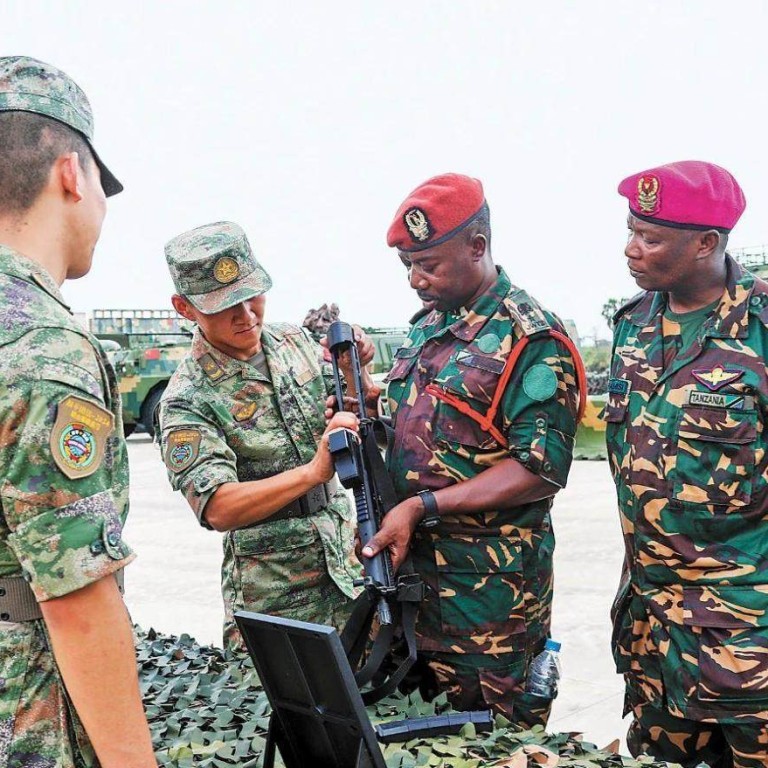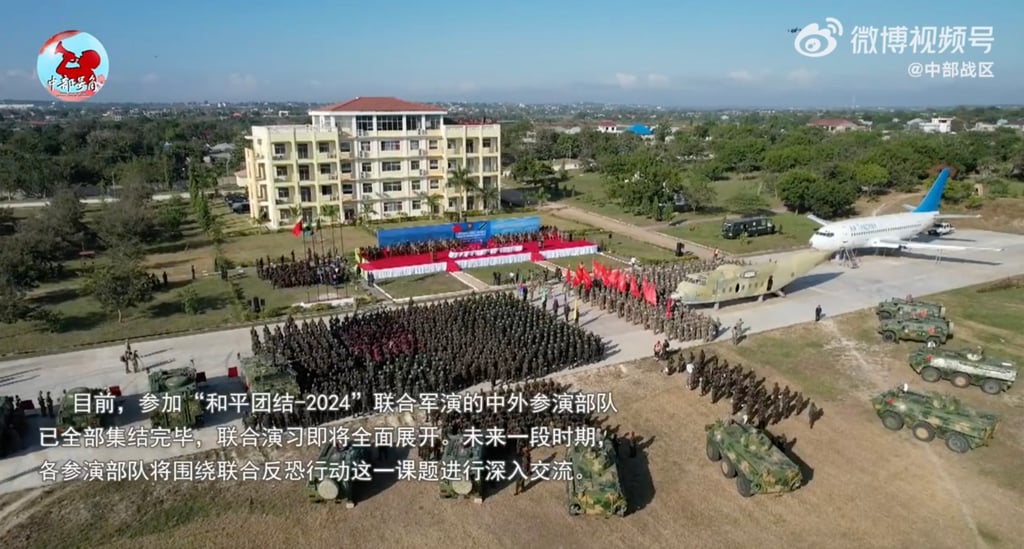Beijing is strengthening its African political ties as a trilateral counterterrorism military drill with Tanzania and Mozambique begins

They also held some tactical training using armoured fighting vehicles and self-propelled assault guns at the Tanzanian military’s Chinese-built comprehensive training centre in Mapinga, Bagamoyo district, in the days leading up to the official start of the joint drill on July 29.
Beijing has sent ground units from the PLA Central Theatre Command as well as a naval flotilla from the Southern Theatre Command to take part in the East African exercise.
“It is what I call a ‘blended approach’ to military-to-military partnership,” Nantulya said.
“This is part of what I term ‘blended military engagement’ that mixes military, defence, political, diplomatic, cultural and commercial engagement,” Nantulya said.
The Chinese navy contingent taking part in the drills are from the 45th naval escort force, and include the guided missile destroyer Hefei, plus the Qilianshan and Wuzhishan – both amphibious dock landing ships.
Nine operations will be practised at sea, according to China’s defence ministry, including port joint defence, counterterrorism tactics, boarding and seizure operations, visit board search and seizure, anti-terrorism and anti-piracy, and joint maritime patrols.
In March, China’s 45th naval fleet, including guided-missile destroyer Urumqi, missile frigate Linyi and comprehensive replenishment vessel Dongpinghu, also visited Tanzania and Mozambique.
It is all part of Beijing’s bid to strengthen and entrench political, commercial, ideological, cultural and wider defence ties, as well as increase China’s global prestige among African audiences, Nantulya said.
China also hopes to achieve interoperability with select African militaries, showcase and advertise its military assets to secure more customers, and test and field new equipment and doctrine, he added.
African countries benefit too. They enhance their exposure and diversify their foreign defence ties, Nantulya said. They also get professional military training, secure alternative sources for weapons and strengthen political ties.
China had been increasing its military exercises with African countries before the Covid pandemic hit, said David Shinn, a China-Africa specialist and professor at George Washington University’s Elliott School of International Affairs. But the global health crisis put a stop to them.
“The PLA is now resuming them, but apparently focusing on counterterrorism,” Shinn said.
Theoretically, Shinn said any African military exercise with a more advanced army is a positive development. In this case, he said the key to success would be the relevance of the exercise to the particular terrorist challenges in Mozambique and Tanzania.
Tanzania has emerged as a key destination for China’s military cooperation, with the current exercise their fourth joint drill since 2014.
“China has a long-standing relationship, particularly with the Tanzanian People’s Defence Force, and holds periodic exercises with it,” Shinn said.

Zhou Yuyuan, deputy director at the Centre for West Asian and African Studies, Shanghai Institutes for International Studies, said the counterterrorism theme for the current joint military drill showed the Chinese defence ministry’s commitment to it.
“But overall, this joint exercise remains a regular military exchange or military diplomacy,” Zhou said.
It will also be a “warm-up for this year’s FOCAC summit”, Zhou said, referring to the Forum on China-Africa Cooperation event to be held in Beijing next month.
He added that the three Chinese warships taking part in the exercise were the main battleships of the PLA Navy and could provide important practice for future maritime security cooperation between African countries and China.
Francois Vrey, a professor emeritus of military science and a research coordinator at the Security Institute for Governance and Leadership in Africa at Stellenbosch University, South Africa, noted that Tanzania and Mozambique both border the Western Indian Ocean, which ties into China’s Maritime Silk Road and gives all three countries a common interest in stable seas in the region.
The anti-terrorism theme for the drill was not unexpected, he said, given that China had a vested interest in the offshore gas fields off the coast of northern Mozambique, with the Tanzanian side also entering the fold.
“China thus has an interest in landward and maritime stability in and off these two countries,” Vrey said. “This exercise is military diplomacy – and what better than bringing your ‘grey hulls’ into the picture?”
China currently has thousands of military personnel stationed at its first overseas naval base in Djibouti, which officially opened in 2017, with an aim to protect Chinese investments and citizens in Africa.
Source: South China Morning Post



